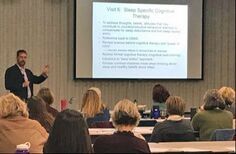 Author: Annie Bassoni, LCSW, KSCSW Board Member Can clinical social workers and other behavioral health clinicians effectively treat chronic pain and insomnia? Participants at the 2018 KSCSW Winter Conference learned that the answer to this question is a resounding “yes!”—good news for the large crowd of practicing clinicians at the Conference, which was held on December 7th at the Fayette County Extension Office. The UK College of Social Work’s Integrated Behavioral Health (IBH) program co-sponsored the Winter Conference, which enabled the 2018-19 (MSW) cohort of IBH students to attend this special learning opportunity.  With Kentucky ranked among the top ten states with the highest opioid-related overdose death it is more important than ever for mental health clinicians to find practice interventions to help clients manage chronic pain. Dr. Erica Adams, PhD, presented on the topic of Behavioral Health Treatment of Chronic Pain during the morning session. She described pain as a protective mind-body response where the body becomes increasingly sensitive to perceived threats and this leads the brain to produce pain responses not proportional to actual situations. Because of this Dr. Adams described the nervous system as “getting better” at being in pain as it learns from experiences, but this also means that people can learn to utilize other practices to reduce pain. As Dr. Adams said, “The explanation for chronic pain is also the solution!." There is well documented crisis with the overuse of opioids to manage pain and Dr. Adams found there to be less focus of psychosocial factors that if addressed may reduce pain. She describes successfully using the biopsychosocial model to reduce chronic pain without use of medication or surgery. It was helpful to understand the psychosocial impacts of chronic pain on an individual and their relationship with self, partners, family and support systems. The argument she makes is that increased self-efficacy and coping strategies along with a willingness and readiness to change can lead to decreased pain, distress and disability. The process of using CBT to reduce catastrophizing led to changes in the brain and thus the interpretation of pain. Dr. Adams described her practice of Pain-CBT with her patients and the success she is finding with this intervention. She offers other modes of integrative medicine and treatment which are also helpful in reducing chronic pain. The afternoon session was led by Dr. Ryan Wetzler, PsyD, who was excited to share his approach to treating chronic insomnia using CBT-Insomnia (CBT-I). Dr. Wetzler described traditional methods and interventions for treating chronic insomnia that have not been effective for the patients he treats; he also reviewed the impact of sleep on our mental and physical health such as increased depression, weight gain, and pain. He encouraged us to stop talking about sleep hygiene education and to avoid use of medications for sleep. Dr. Wetzler presented data that he said indicates CBT-I as the most promising first-line treatment, though he cautioned a careful evaluation should be done to determine if a person is an ideal candidate for this type of intervention. There is a specific session-by-session guide for using CBT-I that includes therapies of sleep restriction, stimulus control, use of mindfulness and relaxation training. When all this is used together chronic insomnia can purportedly be eliminated in individuals. There was so much good information and data that we ran out of time to really delve into these treatments. I hope you will make plans to attend the KSCSW Winter Conference 2019, especially if lunch is again provided by Selma’s!
0 Comments
Leave a Reply. |
AuthorWrite something about yourself. No need to be fancy, just an overview. Archives
July 2024
Categories |
